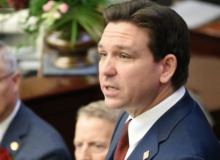America is well into a growing food crisis, with shelves empty of baby formula, serious egg shortages, and now to a major hiccup in the chain of chicken products.
Wayne Farms recalled 30,285 pounds of ready-to-eat chicken breast fillet products because they may be undercooked, according to the U.S. Department of Agriculture.
The recall was originally issued on April 29, but was reissued and expanded on May 7 when the original recall did not root out the undercooked chicken.
The FDA added that the chicken was packaged between Feb. 7 and April 30. The recall affects products with the line “EST.2014” on the case and packaging. The packages also have the production codes 23618, 24357, 24512, 24583, and 24957 with 66 different “use by” dates, ranging from May 10, 2022, to April 4, 2023.
“The problem was discovered when the firm received a customer complaint that the RTE chicken product appeared to be undercooked,” the FDA added.
“FSIS is concerned that some products may be in consumers’ or restaurants’ freezers or refrigerators,” the FDA continued. “Consumers are urged not to eat these products. Restaurants are urged not to serve these products. These products should be thrown away or returned to the place of purchase.”
No one has reported any illness or injury from the product. But eating undercooked chicken can cause food poisoning.
The recall from Wayne Farms is not the first problem to befall the chicken production chain. Earlier in the year, millions of birds across the U.S. and Europe died from the bird flu and hundreds of thousands of ducks and chickens were euthanized to try and stop the advance of the disease.
Early in May, Oklahoma became the 31st state to confirm that the avian flu had reached its borders, with the Sooner state joining the nation in beginning to institute mass euthanizing of poultry, NPR reported.
More than 35 million birds in the U.S. have died or been killed due to the avian flu, the second-worst spread of the disease in history, according to Reuters. France has culled 16 million birds and the disease has also been found in Britain, Italy and Spain.
The birds affected are in both commercial flocks and in the wild.
The troubles with the avian flu and recalled products is only compounded by the strange rash of disasters befalling American food processing plants that have raised troubling questions.
These disasters are unfortunate, to say the least, because they are coming ahead of a planting season that may not be able to produce enough food to replace ease the problems.
The war in Ukraine is wrecking havoc in the production of food in Europe, which is bad enough. But a more serious food crisis looms as a result of the war.
Much of the world gets its supply of fertilizer from Russia, in fact two-thirds of the world’s farms use fertilizers that come from there.
But with Russia’s invasion of Ukraine bringing sanctions down upon the Russian Bear, those fertilizers are still sitting in Russia and won’t be available for the world’s farmers for this year’s planting season.
At least one American is taking matters into his own hands. Food has gotten so expensive under the Biden administration that a Tennessee man is working to solve the problem by farming his own fish.
Harvey Tallman of Athens, Tennessee, started a fish farm in his yard to compliment his large vegetable garden, bringing to mind the Victory Gardens from WWII.
But the appalling thing is that Americans are being sent back 50 years when the country was beset by a Great Depression and World War, reducing our citizens to want and deprivation.
How did it take one president less than 15 months to do this to the nation?
(This post originally appeared at Western Journal)
Follow Warner Todd Huston on Facebook at: facebook.com/Warner.Todd.Huston, or Truth Social @WarnerToddHuston
Tags: Commentary Economy Food Joe Biden




















Join the conversation!
We have no tolerance for comments containing violence, racism, vulgarity, profanity, all caps, or discourteous behavior. Thank you for partnering with us to maintain a courteous and useful public environment where we can engage in reasonable discourse.